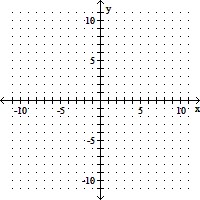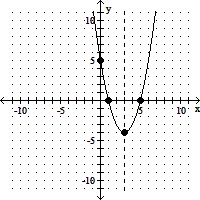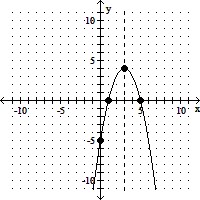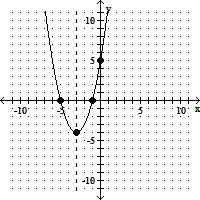Graph the given equation. Find the vertex, axis of symmetry, and intercepts.f(x) = -x2 - 6x - 5
A. vertex: (3, -4)
axis of symmetry: x = 3
x-intercepts: 1 and 5; y-intercept: 5
B. vertex: (3, 4)
axis of symmetry: x = 3
x-intercepts: 1 and 5; y-intercept: -5
C. vertex: (-3, 4)
axis of symmetry: x = -3
x-intercepts: - 5 and -1; y-intercept: -5
D. vertex: (-3, -4)
axis of symmetry: x = -3
x-intercepts: - 5 and -1; y-intercept: 5
Answer: C
You might also like to view...
Find the convergence set for the given power series. Hint: First find a formula for the nth term; then use the Absolute Ratio Test. -
-  +
+  - . . .
- . . .
A. -1 ? x ? 1 B. -1 ? x < 1 C. -1 < x ? 1 D. All x
Add. Simplify the result whenever possible. +
+ 
A. 
B. 
C. 
D. 
Find the maximum value of Q(x) subject to the constraint xTx = 1.Q(x) = 2 + 9
+ 9 + 5
+ 5
A. 9 B. 18 C. 2 D. 5
Factor by grouping.8x2 + 20xy + 6xy + 15y2
A. (4x + 3)(2x + 5) B. (4x - 3y)(2x + 5y) C. (8x + 3y)(x + 5y) D. (4x + 3y)(2x + 5y)